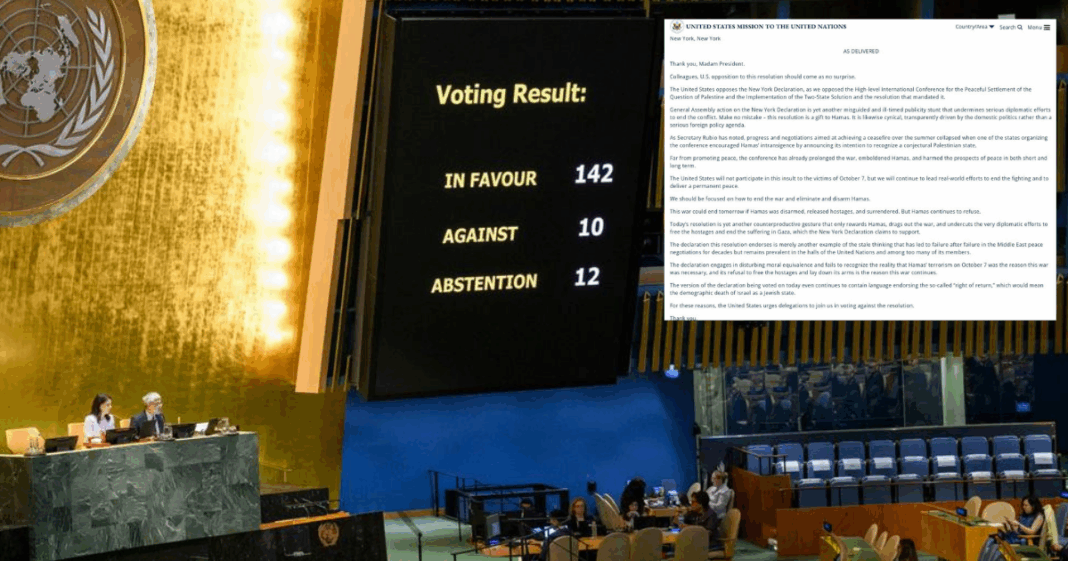The United States voted against a United Nations General Assembly resolution supporting the New York Declaration on Palestinian statehood. A senior diplomat called the motion a “misguided publicity stunt” that rewards Hamas and hurts attempts to make peace.
The U.N. General Assembly on Friday approved a resolution endorsing the “New York Declaration,” a roadmap toward implementing a two-state solution for Israel and the Palestinians, with 142 countries voting in favor, 10 against and 12 abstaining, according to UN News. The declaration grew out of a July high-level conference at U.N. Headquarters co-organized by France and Saudi Arabia and is due to resume later this month.
Before the vote, France’s U.N. ambassador, Jérôme Bonnafont, said the text “lays out a single roadmap to deliver the two-State solution,” as quoted by UN News. The plan calls for an immediate cease-fire in Gaza, the release of all hostages, the establishment of a viable, sovereign Palestinian state, the disarmament of Hamas and its exclusion from governing Gaza, steps toward normalization between Israel and Arab countries, and collective security guarantees.
The resolution condemns both the October 7 Hamas attack on southern Israel and Israel’s siege of Gaza, which has created what the UN called a humanitarian catastrophe.
Speaking at the UN headquarters, Morgan Ortagus, counselor at the U.S. Mission to the United Nations, delivered a sharp rebuke of the resolution during Thursday’s vote. “Make no mistake – this resolution is a gift to Hamas,” Ortagus said, according to the mission’s official statement.
The American opposition centered on five key concerns that reveal deep U.S. skepticism about the UN approach to Middle East diplomacy
Timing and Political Motivations
The United States characterized the resolution as poorly timed and politically driven. Ortagus described the measure as “yet another misguided and ill-timed publicity stunt” that she said was “transparently driven by domestic politics rather than a serious foreign policy agenda.”
The U.S. argued that the resolution undermines ongoing diplomatic efforts to end the conflict rather than supporting them.
Impact on Hamas
American officials expressed concern that the resolution strengthens Hamas’s position in negotiations. The U.S. mission cited Secretary of State Marco Rubio’s observation that ceasefire negotiations collapsed over the summer when conference organizers announced intentions to recognize a Palestinian state, allegedly encouraging Hamas intransigence.
“Far from promoting peace, the conference has already prolonged the war, emboldened Hamas, and harmed the prospects of peace,” the U.S. statement said.
Moral Equivalence Concerns
The United States criticized what it called “disturbing moral equivalence” in the declaration, arguing it fails to properly acknowledge Hamas’s October 7 attacks as the catalyst for the current conflict.
“The declaration fails to recognize the reality that Hamas’ terrorism on October 7 was the reason this war was necessary,” according to the U.S. position.
‘Right of Return’ Language
American officials objected to language endorsing the Palestinian “right of return,” which the U.S. said “would mean the demographic death of Israel as a Jewish state.”
Alternative Approach Preferred
The United States emphasized its preference for direct negotiations focused on immediate objectives. “This war could end tomorrow if Hamas was disarmed, released hostages, and surrendered,” Ortagus said.
The U.S. position reflects a focus on Hamas’s military capabilities and hostage releases as prerequisites for peace, rather than broader political settlements through international declarations.
A global media for the latest news, entertainment, music fashion, and more.














